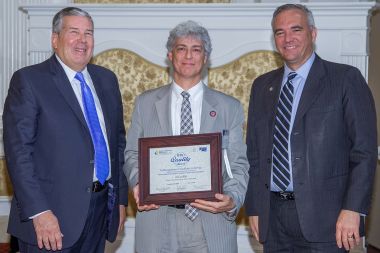Stopping Sepsis
 |
|
School of Social Welfare lecturer Al Cardillo, center, accepts the Quality Award for his ongoing collaboration, expertise and work into sepsis education for home health professionals and the public. |
ALBANY, N.Y. (July 11, 2018) – When an infection goes unchecked, sepsis – a life-threatening systemic infection – can result. And the majority of sepsis cases begin at home, where diagnosis can take longer.
This is not widely known, and until recently, efforts to combat this deadly disease focused on hospitals, not on identifying sepsis at home.
Al Cardillo, a lecturer in the School of Social Welfare, is leading the efforts to stop sepsis in at-risk patients being cared for at home, and was recently honored for his work. He is a 1981 LMSW alum of the School.
Last month he won a Quality Award from IPRO, a national, non-profit health care measurement and improvement organization, for his ongoing collaboration, expertise and work into sepsis education for home health professionals and the public.
For Cardillo, the question is not why he became passionate on this subject, but how could he not.
“Seeing how this condition can ravage and kill people (the top killer in U.S. hospitals, a major cause of amputations and a vast array of long-term physical, psychosocial and life problems in people throughout New York and the U.S.) and be way under-recognized and not understood not only by the public but by the health care community, how could anyone do anything but respond?” he said.
Cardillo’s passion for educating the public on this issue began when he was contacted by the National Sepsis Alliance to assess the delivery systems for sepsis identification in New York State.
In his role as executive vice president of the Home Care Association of New York, he started to examine the prevalence of sepsis in the home and community.
In his research, he discovered virtually all the focus was on critical care in hospitals because this is where patients were winding up, in the emergency room, fighting for their lives.
“Nothing was being done to leverage this part of the health system (home and community) in sepsis response,” he said, even though the research showed 80 percent of the cases began at home or in the community.
The state was ready to act, moved by the death of Rory Staunton, a 12-year-old boy who lost his life to sepsis from an infection that stemmed from a cut he got while playing basketball.
Cardillo and his colleagues, particularly Amy Bowerman, a registered nurse with Senior Network Health in Utica, worked with top medical experts at the National Sepsis Alliance, the Rory Staunton Foundation for Sepsis Prevention and others to create a national first-of-its kind sepsis screening and intervention tool for use by home and community-based providers.
Cardillo and his team have been conducting in-depth education sessions across the state toward statewide adoption of this critical new tool. The screening tool includes simple but detailed forms to check for symptoms that could indicate sepsis, as well as specific instructions for follow-up and intervention.
In support of the Home Care Association (HCA) of NYS’s “Stop Sepsis at Home New York” initiative, Cardillo secured a major NYS Health Foundation grant through which in-person sepsis training has been provided to home care agencies and provider partners across the state.
“Mr. Cardillo’s commitment to improving health care delivery in the home setting is evidenced through his leadership of initiatives addressing the early identification and treatment of sepsis, which have gained statewide and national recognition,” said Sara Butterfield of IPRO.
“Diligence in infection prevention and prompt care upon infection are critical to sepsis prevention and migration,” Cardillo said. “The possibility of preventing sepsis-related impairment and death increases substantially with early identification and prompt treatment.”
![]() For more news, subscribe to UAlbany's RSS headline feeds
For more news, subscribe to UAlbany's RSS headline feeds
A comprehensive public research university, the University at Albany-SUNY offers more than 120 undergraduate majors and minors and 125 master's, doctoral and graduate certificate programs. UAlbany is a leader among all New York State colleges and universities in such diverse fields as atmospheric and environmental sciences, business, education, public health,health sciences, criminal justice, emergency preparedness, engineering and applied sciences, informatics, public administration, social welfare and sociology, taught by an extensive roster of faculty experts. It also offers expanded academic and research opportunities for students through an affiliation with Albany Law School. With a curriculum enhanced by 600 study-abroad opportunities, UAlbany launches great careers.


